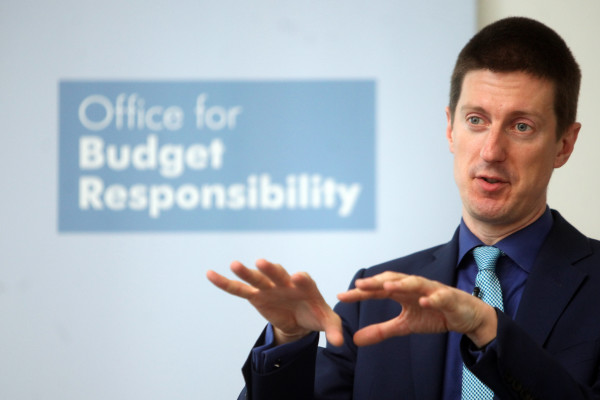

The chairman of the Office for Budget Responsibility has said he is not going to pretend his forecasts about the UK economy are precise.
Speaking to the Treasury select committee this morning (30 November), Robert Chote defended the Office for Budget Responsibility's forecasts but acknowledged they depended on some "broad-brush judgements".
In last week's Autumn Budget the Office for Budget Responsibility (OBR) stated it now expects to see slower GDP growth over the forecast period, mainly reflecting a change in its forecast for productivity growth.
It has revised down its forecast for GDP growth by 0.5 percentage points to 1.5 per cent in 2017, then growth slows in 2018 and 2019, before rising to 1.6 per cent in 2022.
The OBR's forecasts are based on a central assumption there would be an orderly exit of the UK from the European Union but that "until proven otherwise" Britain would have a less open economy.
Mr Chote said he did not pretend that he makes small tweaks in his forecasts "from each event to each event".
Responding to questioning by the committee chairman Nicky Morgan, he said: "If you think about the way in which the economy has performed since the (EU) referendum, there are things which one would have predicted at that stage and we explicitly look at those.
"People would have anticipated that there would have been a fall in the exchange rate and that would have resulted in a squeeze in real consumer incomes and spending and that has indeed happened.
"You would have expected the fall in the exchange rate to provide some boost in the export performance. That has happened, not quite as much as I think others would have anticipated and the impact on net trade has been less of a boost because it has also been accompanied by stronger import growth.
"You don't throw up your hands in the air and say there is no point trying to say anything about this whole process at all.
"You can say useful things and then you track how things perform as a result.
"You are right in saying this is very important but we shouldn't allow importance to tempt us into pretending a precision that we don't have."
Mr Chote also dismissed the idea that the outside world is dependent on his forecasts, saying there are many more predictions for the UK economy that do not have the same constraints placed upon them as the OBR.
He said: "The idea that the outside world is hugely dependent on what we say on the macro side would be hugely self-aggrandising for us and I wouldn't make that claim."
Mr Chote also responded to allegations that the OBR was being anti-Brexit in its central assumption of the UK being less open to trade after its departure from the European Union.
He said: "That would be an accusation without any foundation whatsoever. We are making a judgement on the basis of the information that is available to us.
"We look at the range of outside analyses and made our own judgements as well on the grounds of what the most likely direction of openness was going to be, but as I said, making some assumption that until proven otherwise you are more likely to see access to EU markets less easy rather than more easy as a consequence of this.
"As we highlight throughout, obviously it depends on what the deal is with the EU and it depends on what you do in other countries as well.
"To have come up with a very non-consensus view that it was going to push you in the other direction, people would probably have concluded that was unrealistically convenient for the government."
Sir Charles Bean, a member of the OBR's Budget responsibility committee, said the big issue facing the UK economy was not Brexit but poor productivity figures.
He said: "If you could do something to address that successfully it would completely swamp the Brexit consequences."
In its economic and fiscal outlook, published last week with the Budget, the OBR revised down its forecast on productivity growth.
Sir Charles said: "We have come to the point where experience has triumphed over hope. For repeated forecasts we have had this assumption that there would be a pretty imminent reversion to something like the pre-crisis trend and the failure of that to show up has prompted us really to stand back and think does it really make sense to be continuing to say this recovery is just around the corner?
"It is worth stressing that the slow down in productivity growth is an international phenomenon. It is not a UK phenomenon. It may look a little more pronounced here and part of the reason for that is simply that a lot of the growth in recent years in the UK has been overly concentrated in relatively low-productivity sectors."
Mr Chote and Sir Charles's comments come after Ann Pettifor, director of Prime Economics, accused the Office for Budget Responsibility and the government of wrongly focusing on the UK’s weak productivity growth in a way that is harming the future economic prospects of the country.
Ms Pettifor was before the Treasury Select Committee yesterday (29 November) giving her reaction to chancellor Philip Hammond's Budget.
She is credited in some quarters with having predicted the 2008 financial crisis.
damian.fantato@ft.com



